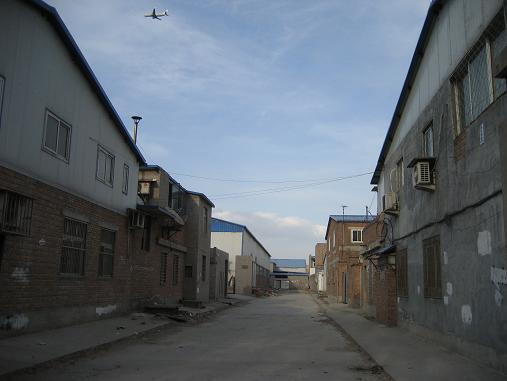
An airplane flies over abandoned factories in Pi village before landing at Beijing's Capital Airport
Pi village (皮村)has been scheduled for demolition. Next year, the bulldozers will move in and Pi, together with many other communities south of Beijing’s Capital Airport, will be razed to the ground and replaced by a financial and logistics centre, luxury villas and golf courses.
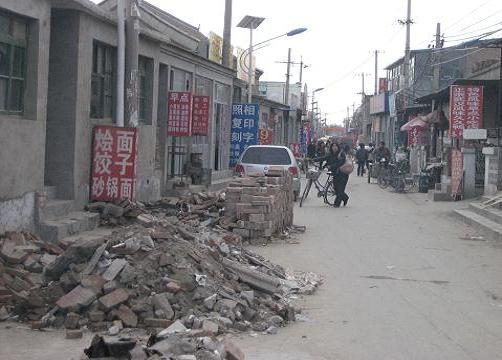
Building rubble lines the main street in Pi village
At yet, today Pi village is in the midst of a building boom. Hundreds of migrant workers jam the village’s narrow streets busily erecting extensions and adding new floors to existing structures. The reason for this sudden surge of construction is simple; the local villagers who own the land are banking on the fact that if they add to their property now, they will get additional compensation when the government knocks it down. The migrant workers who are building these structures and who have lived and worked in the village for the last decade or more however will get nothing at all and be forced to move home all over again.
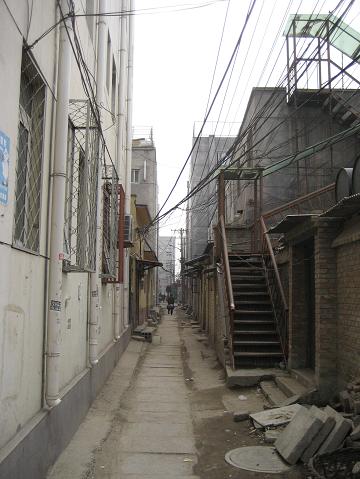
Over in the northwest of the city, the wrecker’s ball is also hanging over another village. However in Tangjialing (唐家岭) there is not a lot of building work going on; probably because there is absolutely no available space left to build on. The village is already jammed solid with four or five-storey concrete blocks, separated by narrow litter strewn alleyways, which over the last decade have become home to nearly 50,000 migrants. This previously obscure village of around 3,000 residents shot to national fame last year when it was highlighted in the book Ant Tribe (蚁族) which profiled the lives of young university graduates working in low-paid jobs and living in cramped, dormitory-like accommodation in the very outer suburbs of Beijing.
An alleyway behind a dormitory building in Tangjialing
Tangjialing is now perhaps the best known of Beijing’s “ant colonies” but it too will soon fall victim to the capital’s insatiable demand for land. The village is located in fruit orchards just over a kilometer north of ZPark (中关村软件园), the hi-tech development zone that is home to Baidu, Lenovo, IBM and numerous other computer companies. And, as such, the adjacent land has become just too valuable for the developers to ignore. The landowners in Tangjialing have reportedly been offered 800 yuan per square meter for their properties but only for the first two stories. They have roundly rejected this initial offer and are instead demanding 5,000 yuan per square meter for all stories.
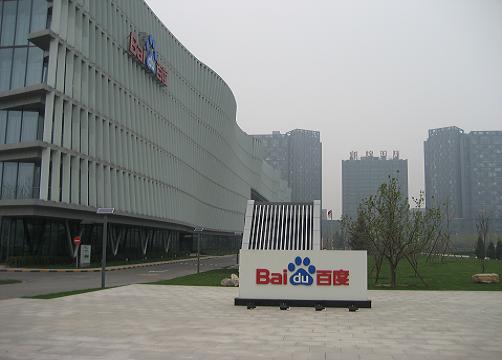
Baidu headquarters in ZPark, near Tangjialing
While the landowners haggle with the local government and the developers over compensation, Tangjialing’s ants have been left out in the cold. Many are already looking for new accommodation in other colonies, some are thinking about leaving Beijing altogether.
“Something will turn up,” one graduate said. “But if it doesn’t, I guess we will have to think about going back home.” Home in his case was the northeastern province of Heilongjiang. “I know many people who have already gone back home or moved to other small cities. It is just too expensive to live here now if you don’t have a good job,” he added.
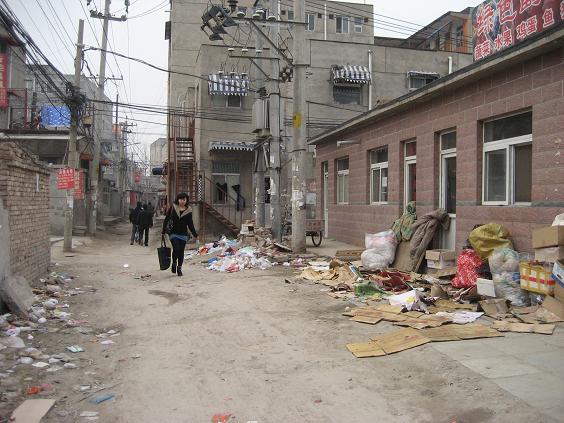
Street scene in Tangjialing
The ants do have the advantage however of being relatively mobile. They are nearly all single, have no dependants and few possessions. The 7,000 migrants of Pi village are not so lucky. Among those who will have to move when demolition begins are the more than 300 children currently attending the One Heart Experimental School (同心实验学校) for migrant children in the village. If the school cannot find suitable premises elsewhere within the next year or so, many of the students will have to go back “home” to Jiangxi, Anhui, Sichuan and Shaanxi.
There is no guarantee at present that the Chaoyang district government will provide places in the state system for the village school children once the school is demolished. The Chaoyang education department, which came under a hail of criticism earlier this year for its decision to close about 20 migrant schools without providing places for displaced students, subsequently pledged that “no school-age child will be out of school” but thus far there is very little evidence the government is living up to its promise. Teachers and parents in Pi village are not optimistic.
“The local government will not help us,” one parent said. “We can only rely on ourselves.”
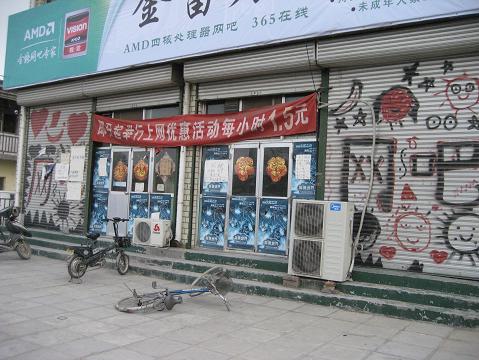
An Internet cafe in Pi village. Rates: 1.5 yuan per hour
The One Heart Experimental School has actually revived education in the village after the original state-run school closed due to declining population in the 1980s, and today it provides kindergarten and primary schooling for the children of local residents as well as migrants. But the state, whose job the One Heart Experimental School is currently doing, has so far done nothing to help it.
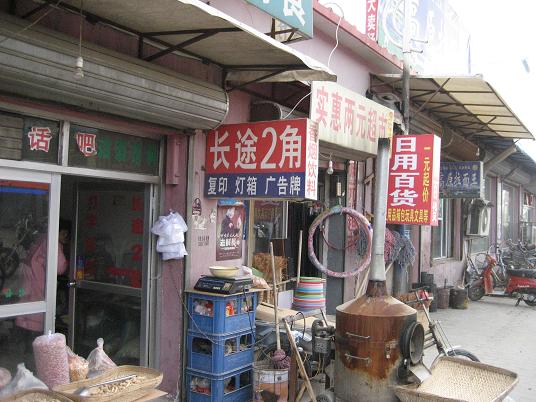
Shop on Pi Village main street offering long-distance telephone calls for 20 cents
Pi village and Tangjialing are without any doubt both slums, similar in many ways to the townships of Cape Town and the barrios of Mexico City. But the only people who will benefit from Beijing’s proposed slum clearance are government officials and real estate development companies. Local villagers will get some compensation, although not nearly as much as they want, but the migrants who have rented those villagers’ houses and have helped to revive the local economy will be left homeless and destitute. And as a result, the slums that are knocked down today will only reappear somewhere else tomorrow.
Map showing location of Pi Village and Tangjialing on the outskirts of Beijing
View Beijing urban villages in a larger map
